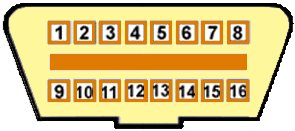Will OBDKey work with all OBD-II compliant vehicles?
OBD stands for on-board diagnostics and defines the modern fuel managed vehicle's electronic interface system
The OBD interface is available on all OBD-II / EOBD compliant vehicles. 2001 and newer petrol cars sold in Europe are EOBD compliant. Diesel (compression ignition) vehicles were not required to support OBD until 2004. Some pre-2001 petrol vehicles and pre-2004 diesel vehicles have a 16-pin connectors but they may not be OBD-II or EOBD compliant. OBDKey also features full CAN bus compatibility with the latest vehicles from 2008 onwards.

16 pin OBD connector
Locating your OBD connector can be a difficult task as vehicle manufacturers tend to hide away the socket. But it is worth knowing that the OBD connector will always be found inside the vehicle and within easy reach from the driver's set position. Check in the driver's foot well, under the steering wheel, behind panels in the dashboard fascia and the central area between the driver's seat and the passenger seat. Some connectors have been located behind ashtrays, under the passenger seat and even over by the passengers door.
Once you find the OBD connector, check which pins which are present. The view above is shown looking into the connector, with the locating "bump" at the bottom.
The connector must have pins 4, 5 for ground connections and pin 16 for 12 volt power supply from the vehicle battery.
The following connections are dependent on the protocol in use by the vehicle:
![]() Pin 2 and pin 10 for SAE J1850 (PWM or VPWM) protocols.
Pin 2 and pin 10 for SAE J1850 (PWM or VPWM) protocols.
![]() Pin 7 for ISO 9141-2 and ISO 14230 (KWP2000) communications. Pin 7 is also known as the K-Line.
Pin 7 for ISO 9141-2 and ISO 14230 (KWP2000) communications. Pin 7 is also known as the K-Line.
![]() Pin 15 is also known as the L-Line. may or may not be present for these protocols.
Pin 15 is also known as the L-Line. may or may not be present for these protocols.
![]() Pin 6 and pin 14 are present for CAN bus (ISO 15765-4) protocols.
Pin 6 and pin 14 are present for CAN bus (ISO 15765-4) protocols.
Generally speaking the following vehicles have these protocols:
![]() VPWM: General Motors, Chrysler
VPWM: General Motors, Chrysler
![]() PWM: Ford models to 2003 with EEC-V engine management system. Including Ford Cougar (all UK models), Ford Puma (1.6 and 1.7), Ford Fiesta Zetec models to 2003, Ford Mondeo Zetec models to 2003, Ford Focus to 2003. Newer Jaguar S-Type and Jaguar X-Type. Pre 2004 Mazdas
PWM: Ford models to 2003 with EEC-V engine management system. Including Ford Cougar (all UK models), Ford Puma (1.6 and 1.7), Ford Fiesta Zetec models to 2003, Ford Mondeo Zetec models to 2003, Ford Focus to 2003. Newer Jaguar S-Type and Jaguar X-Type. Pre 2004 Mazdas
![]() ISO / KWP2000: Most European and Asian manufacturers. Alfa Romeo, Audi, BMW, Citroen, Fiat, Honda, Hyundai, Jaguar (X300, XK), Jeep since 2004, Kia, Land Rover, Mazda, Mercedes, Mitsubishi, Nissan, Peugeot, Renault, Saab, Skoda, Subaru, Toyota, Vauxhall, Volkswagen (VW) since 2001, Volvo to 2004
ISO / KWP2000: Most European and Asian manufacturers. Alfa Romeo, Audi, BMW, Citroen, Fiat, Honda, Hyundai, Jaguar (X300, XK), Jeep since 2004, Kia, Land Rover, Mazda, Mercedes, Mitsubishi, Nissan, Peugeot, Renault, Saab, Skoda, Subaru, Toyota, Vauxhall, Volkswagen (VW) since 2001, Volvo to 2004
![]() CAN: Ford, Mazda, Volvo since 2004. Some vehicles have a CAN bus system along side the ISO/KWP2000 system for diagnostics as well as inter-module communications.
CAN: Ford, Mazda, Volvo since 2004. Some vehicles have a CAN bus system along side the ISO/KWP2000 system for diagnostics as well as inter-module communications.
![]() Full CAN bus compatibility with the latest vehicles from 2008 onwards.
Full CAN bus compatibility with the latest vehicles from 2008 onwards.
OBDKey supports OBD-II Compliant vehicles